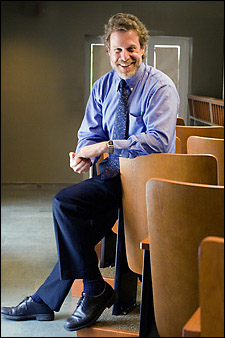High school AP courses do not predict college success in science
Survey of 18,000 students nationwide finds AP classes not comparable to college work

A survey of 18,000 college students enrolled in introductory biology, chemistry, and physics has found little evidence that high school Advanced Placement (AP) courses significantly boost college performance in the sciences. The study by researchers at Harvard University and the University of Virginia (UVA) found the best predictors of success in college science courses to be high school classes that foster mathematical fluency, value depth over breadth, and feature certain types of laboratory work.
Philip M. Sadler of Harvard’s Faculty of Arts and Sciences and the Harvard-Smithsonian Center for Astrophysics presented the findings Feb. 17 at the annual meeting of the American Association for the Advancement of Science in St. Louis.
“Our survey, the largest ever of its type, suggests that AP courses do not contribute substantially to student success in college,” says Sadler, the Frances W. Wright Senior Lecturer in the Department of Astronomy. “Even a score of 5 on an AP test is no guarantee of a college grade of A in the same subject.”
Sadler and UVA’s Robert H. Tai first solicited college and high school educators’ views on the foundations of college science success. They then surveyed 18,000 students at 63 randomly selected colleges and universities to correlate these educational factors with students’ actual performance and persistence in college courses. Among their findings:
- Mathematical fluency is the single best predictor of college performance in biology, chemistry, and physics, giving a strong advantage to students whose high school science courses integrate mathematics. “Draining the math out of high school coursework does students a disservice,” Sadler says. “Much of college biology, chemistry, and physics are taught using the language of math, so students without fluency quickly become lost.”
- Students whose high school coursework emphasizes depth over breadth perform better in college courses. “Hurrying to the back of the textbook, so to speak, is worse than focusing in depth on the first few chapters,” Sadler says.
- Laboratory experience as part of high school courses can be beneficial, but primarily when there is minimal preparation needed beforehand, the outcome of experiments is unknown in advance, and lab reports are written afterward.Many high school and college educators surveyed by Sadler and Tai cited the value of AP courses, widely regarded as the most rigorous offered in most high schools. But college students in this study who had taken AP science courses, scored a 5 on the exam, and then took an introductory college course in the same discipline averaged a college grade of only 90, even after the added study at the college level. Students with an AP score of 4 averaged 87 in freshman science courses in the same subject; students who scored a 3 averaged 84; and students who took a non-AP high school honors course averaged 82. Sadler and Tai attributed roughly half the difference between these grades and the mean college grade of 80 to background variables unrelated to taking an AP course.
“In general,” Sadler says, “it appears that the educational benefits of an AP science course as opposed to a regular high school honors course are smaller than students and teachers have been led to believe.” He advocates that colleges and universities tighten their awarding of AP credit, since many students currently use AP credit to avoid college science courses altogether.
The Advanced Placement Program, administered by the College Board that gives AP exams, was created some 50 years ago at the urging of top universities wishing to encourage more high school students to do college-level work. There are now some 1.5 million AP tests administered annually, a number that has tripled since 1995.
Sadler and Tai’s four-year study was funded by the National Science Foundation, the National Institutes of Health, and the U.S. Department of Education.




